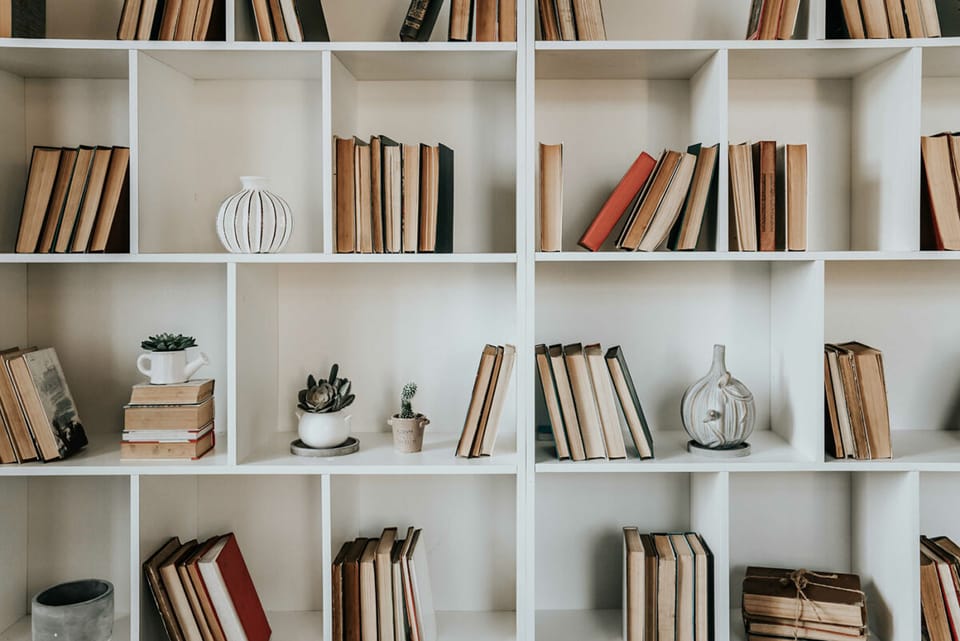The Sacred Object of a Generation is a $59 IKEA Shelf

If you were born after 1985 and you grew up middle class in the Western world, you probably owned the same IKEA bookshelf. You know the one. White laminate. Just tall enough to look adult. Just cheap enough to be bought with babysitting money or student loan overflow. Its joints loosened in six months. It held Murakami novels, a dusty aromatherapy candle, maybe a vinyl record. And no matter where you moved, it came with you, disassembling into soft-edged slats and too many metal pegs.
That bookshelf was both economic symptom and cultural mirror, a staging prop for lives with fewer walls. It was a promise made in Scandinavian minimalism. A thing designed to be replaceable that we never got around to replacing.
I still have mine. It sits in the corner of my office, behind me in Zoom calls, containing a performative number of hardcover books I haven’t finished.
The bookshelf has sagged.
So have I.
The IKEA bookshelf is the totem of a generation that thought adulthood would look like arrival. We assumed there’d be a threshold: get the degree, land the job, buy the house, replace the flatpack furniture with solid oak. We would become people with built-ins. Instead, we became people who had to keep the Allen wrench handy.
We were told that the future was a frontier, that hard work would be rewarded. We believed this not because we were naive but because every institutional mouthpiece insisted it was true. By the time the lie was obvious, we’d already built lives on its foundation. The bookshelf is our relic of that bait and switch. Something flimsy, mass-produced, and burdensome. Something we never quite believed in, and never stopped hauling around.
Every generation gets its own sacred object. For my grandparents, maybe it was the silverware set from their wedding registry — a sign of arrival. The bookshelf is a sign of suspension. We are stuck. Educated but indebted. Mobile but unmoored. Online but unseen. We are told we are free. We are given a bookshelf and nowhere to put it.
It would be easier if we were just broke. But the cruelest trick played on millennials wasn’t poverty. It was false mobility. Just enough money to move cities, not enough to buy. Just enough prestige to feel special, not enough to command loyalty from employers. Just enough cultural capital to curate taste, not enough to own property. We hover in the in-between. The bookshelf comes with us.
I hauled mine through five apartments and two cities. I carried it up fire escapes. I held its frame together with packing tape. At some point, I realized the bookshelf wasn’t a placeholder, so much as a stand-in for a coffin. A casket for the idea that life was linear. A vessel for the detritus of false starts and unmade decisions, and I couldn’t throw it away.
What if I needed it again? What if this wasn’t the last move?
And therein lies the trauma. It’s not that we had the bookshelf. It’s that we never graduated from it.
We were supposed to move on. We were supposed to ascend. And some of us did, at least outwardly. We bought the West Elm version. We got the nicer job title. We upgraded from roommates to partners. But the psychic IKEA remains. The instability, the modularity, the sense that everything could come apart at any time, because nothing was made to last. Not jobs. Not friendships. Not marriages. Not pensions. Certainly not furniture.
Call it grief, I guess. Grief for a version of adulthood that was promised, and never earned because the goal posts kept moving. Grief for the idea that life would accumulate rather than reset. Grief for permanence, however modest.
Like all grief, it hides behind ordinary objects.
A cracked mug. A car, long past its prime. A pile of cords for devices you don’t own anymore (devices nobody owns anymore.)
A bookshelf.
I know people who’ve exorcised their Billy Book Case. Who left it on curbs and walked away free. I envy them. I want to believe in that kind of cleansing, but I don’t. I still keep mine. I can’t quite shake the fear that this is it. That I’ll still have it at 50. That I’ll die and someone will have to carry it down one more set of stairs.
And maybe they’ll pause, and look at it, and feel a pang of recognition.
Because they had the same one.
And it meant the same thing.
And it hurts the same way.